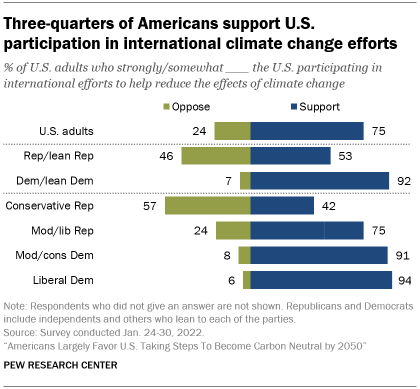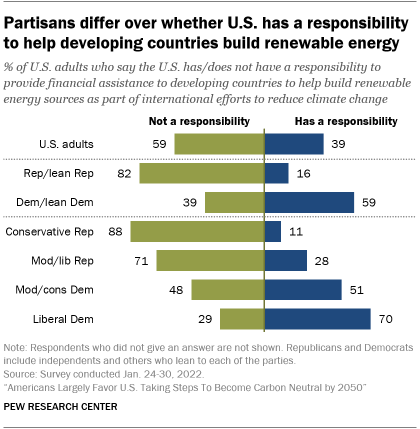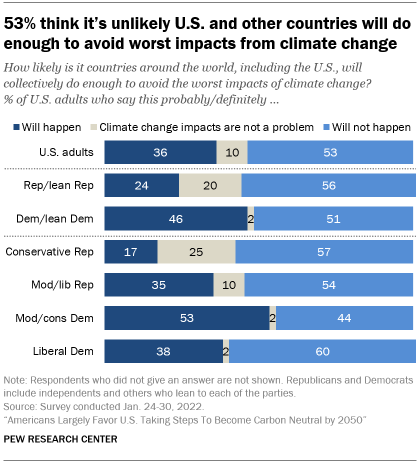Three-quarters of Americans support the United States participating in international efforts to help reduce the effects of climate change, according to a recent Pew Research Center survey.
The survey was conducted shortly before the release of a United Nations report from the Intergovernmental Panel on Climate Change that issued a dire warning of the global consequences ahead, unless there are dramatic increases in climate adaptation efforts.
Pew Research Center conducted this study to understand how Americans view climate and energy issues. For this analysis, we surveyed 10,237 U.S. adults from Jan. 24 to 30, 2022.
Everyone who took part in the survey is a member of the Center’s American Trends Panel (ATP), an online survey panel that is recruited through national, random sampling of residential addresses. This way, nearly all U.S. adults have a chance of selection. The survey is weighted to be representative of the U.S. adult population by gender, race, ethnicity, partisan affiliation, education and other categories. Read more about the ATP’s methodology.
Here are the questions used for this analysis, along with responses, and its methodology.
Nearly all Democrats and Democratic-leaning independents (92%) support a U.S. role in international efforts to reduce climate change impacts, as do 53% of Republicans and GOP leaners. Within the Republican Party, 57% of conservative Republicans oppose U.S. participation in international efforts while 42% support it. Most moderate or liberal Republicans favor U.S. involvement (75%).
But the public generally rejects the idea that the U.S. has a responsibility to help countries with developing economies build their capacity for renewable energy as part of international efforts to reduce the effects of global climate change.
About four-in-ten Americans (39%) say the U.S. has a responsibility to provide financial assistance to developing countries to help them expand renewable energy sources. A majority of Americans (59%) say that the U.S. does not have this responsibility.
The question of aiding developing countries as they transition to renewable energy sources was among the more contentious issues at the UN Climate Change Conference (COP26) held in Glasgow, Scotland, last November.
Americans are divided along partisan and ideological lines over the country’s responsibility to help developing nations. Seven-in ten liberal Democrats say the U.S. has a responsibility to provide aid for this purpose. In contrast, just 11% of conservative Republicans say this, while 88% of them say the U.S. does not have such a responsibility. Those with more moderate views in either party fall in between.
Americans are somewhat pessimistic that countries around the world, including the U.S., will do enough to avoid the worst impacts of climate change. Fewer than half (36%) say that collective efforts will avoid the worst climate effects, while 53% say this will not happen.
That gloomy outlook is shared by about half or more of Republicans (56%) and Democrats (51%).
One-in-ten U.S. adults (and two-in-ten Republicans) do not consider climate change impacts to be a problem.
A 2021 Center survey of publics in 17 advanced economies found an overall median of 46% expressing confidence that actions taken by the international community would significantly reduce the effects of global climate change. A larger share – 52% – were not confident this would happen. The U.S. was near the median on this measure, while those in South Korea (68%) and Singapore (66%) were particularly optimistic that international efforts to address climate change would significantly reduce the effects of global climate change. France stood out for more pessimistic views on this matter, with 65% of its public saying they were not confident this would happen.
Note: Here are the questions used for this analysis, along with responses, and its methodology.







